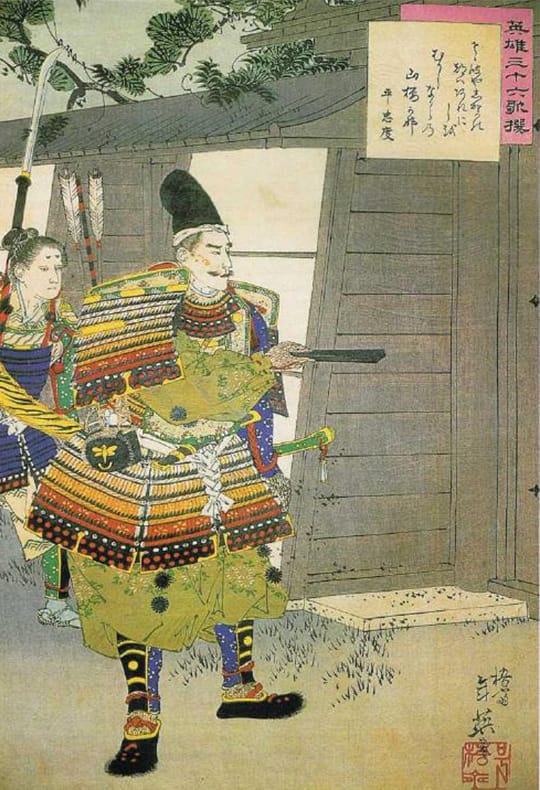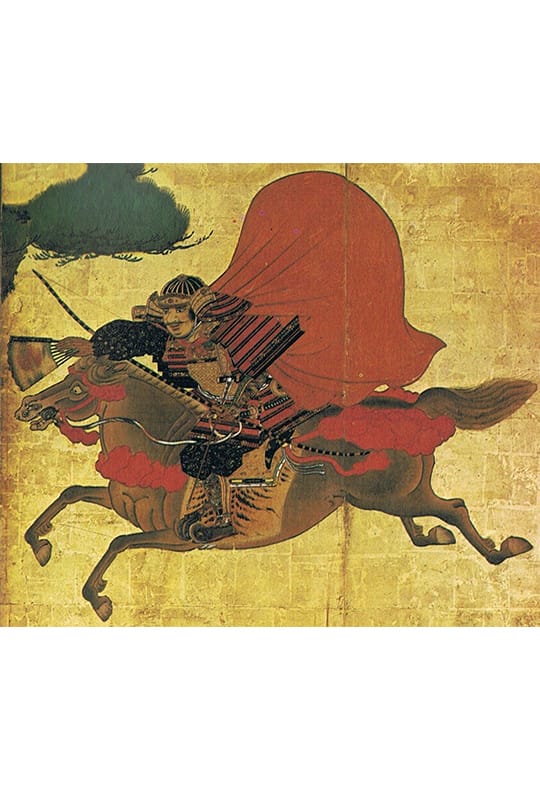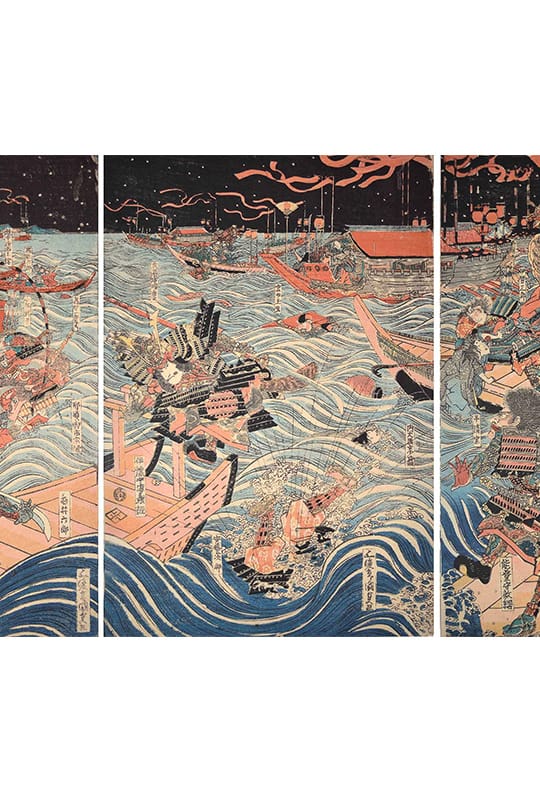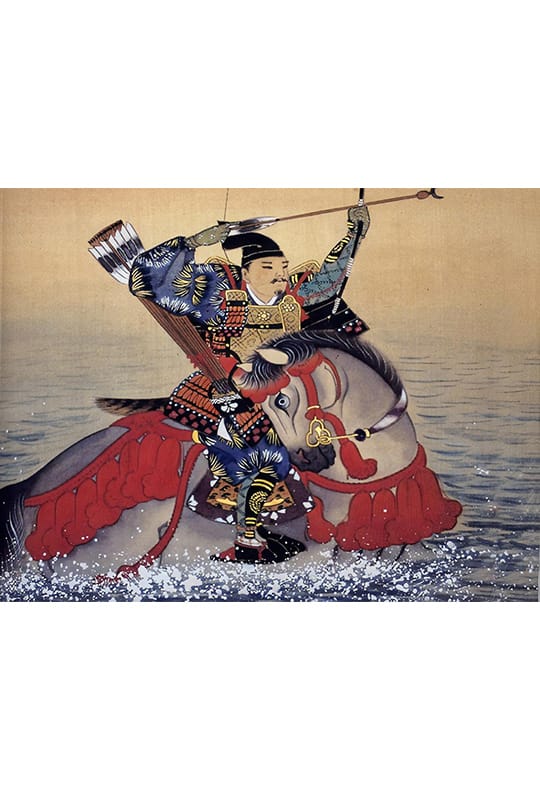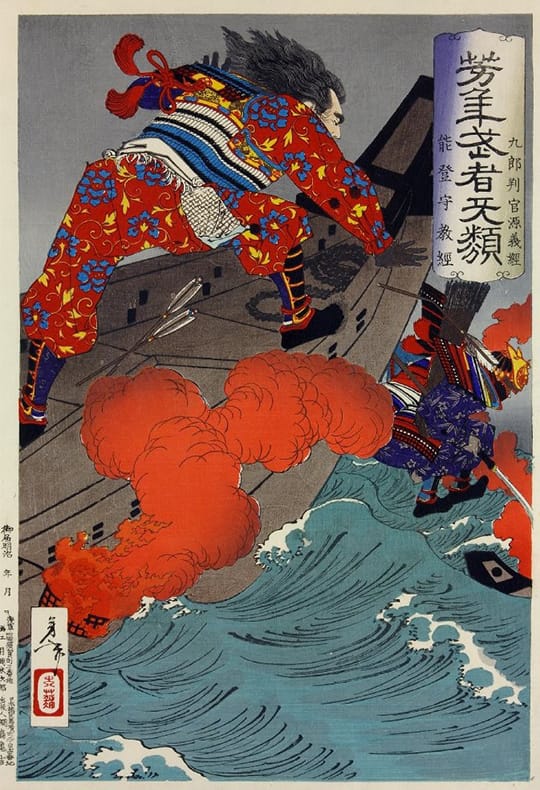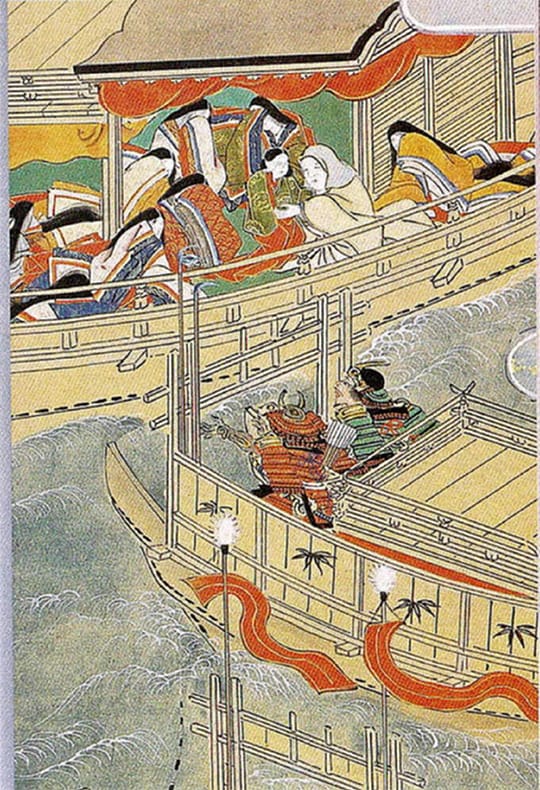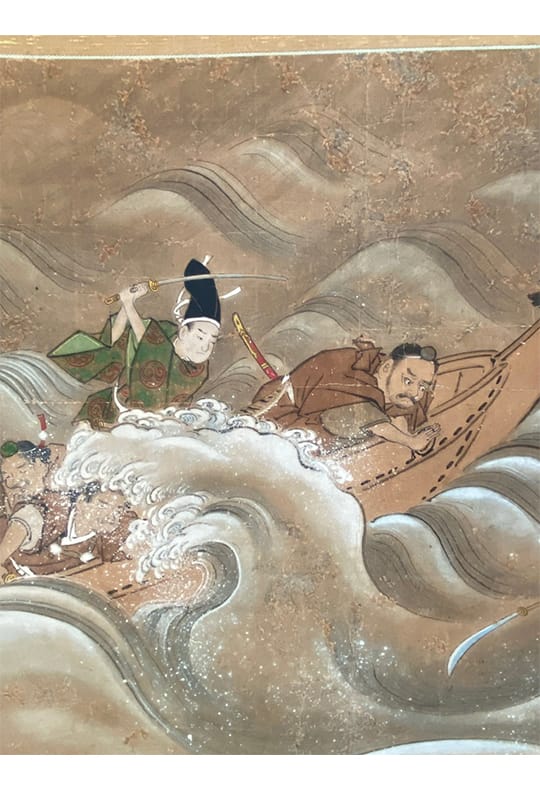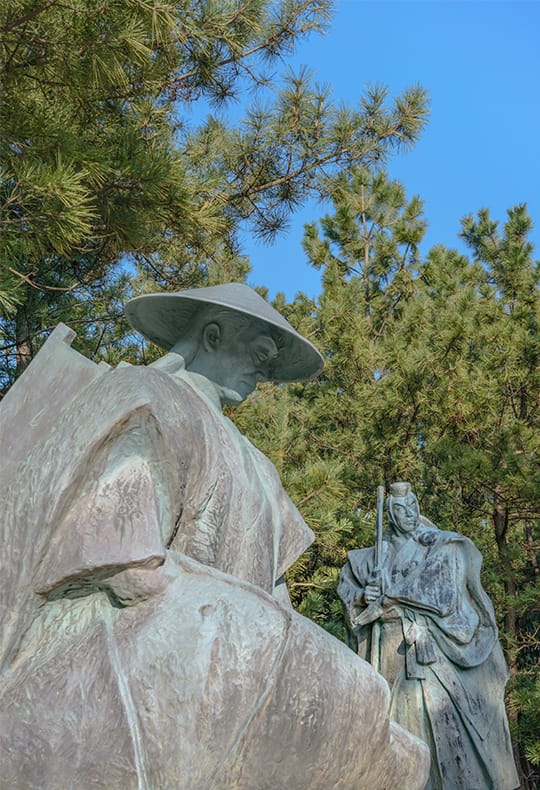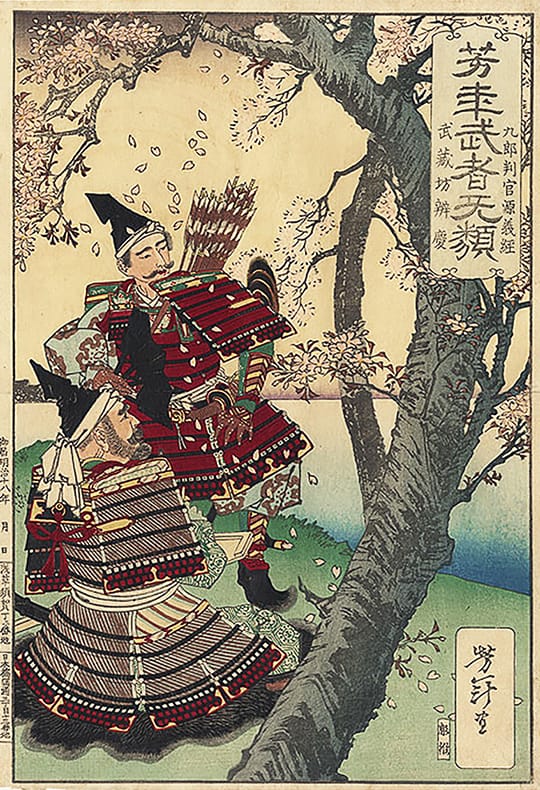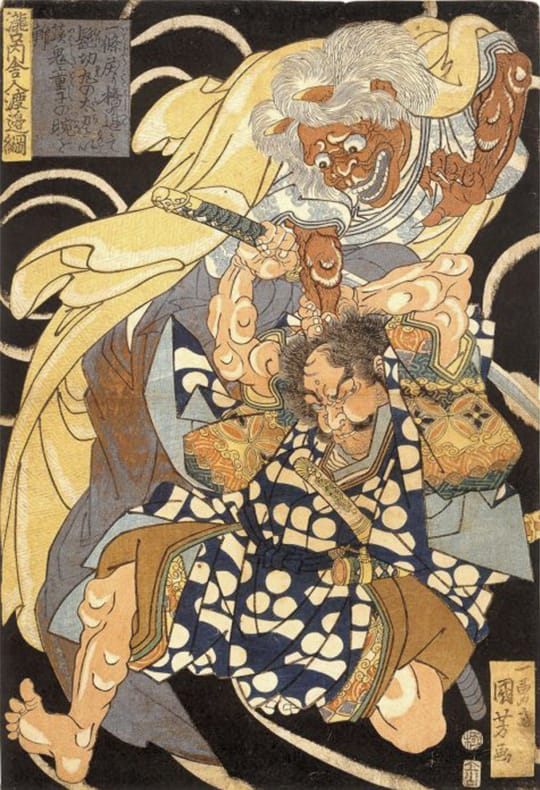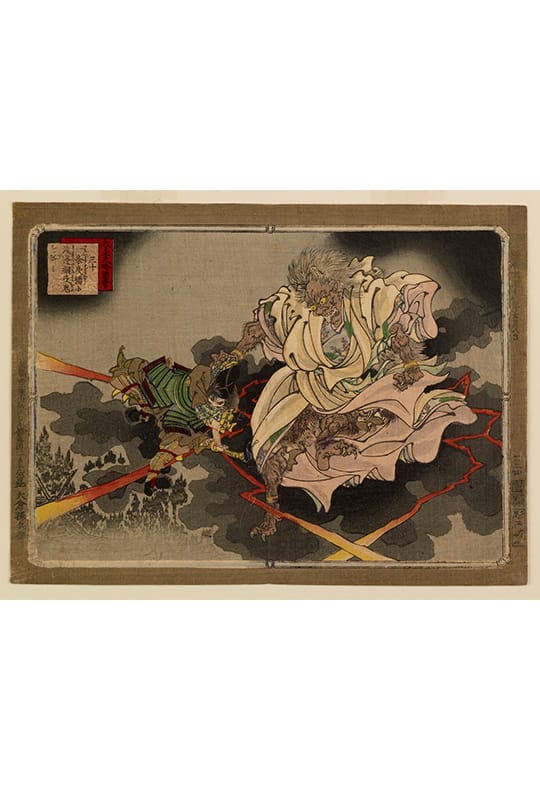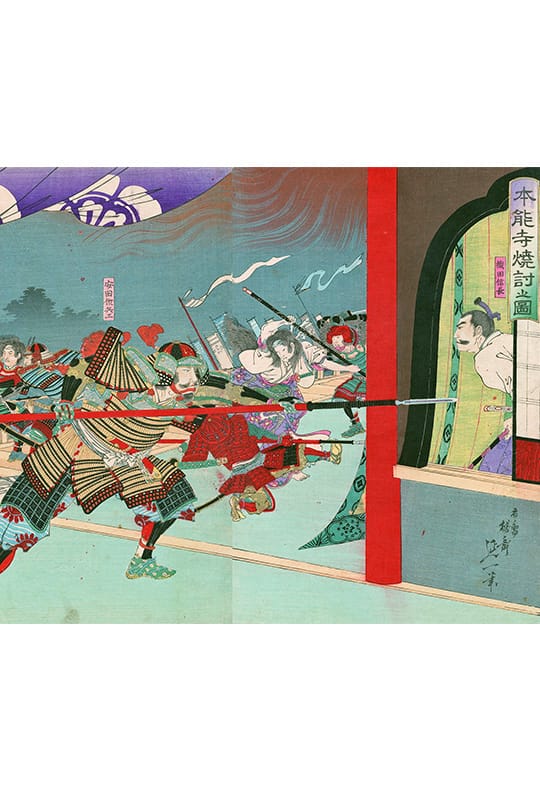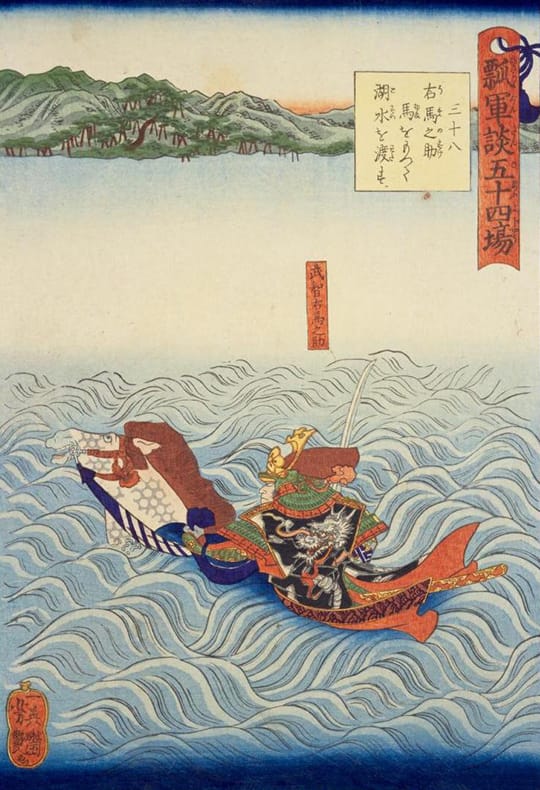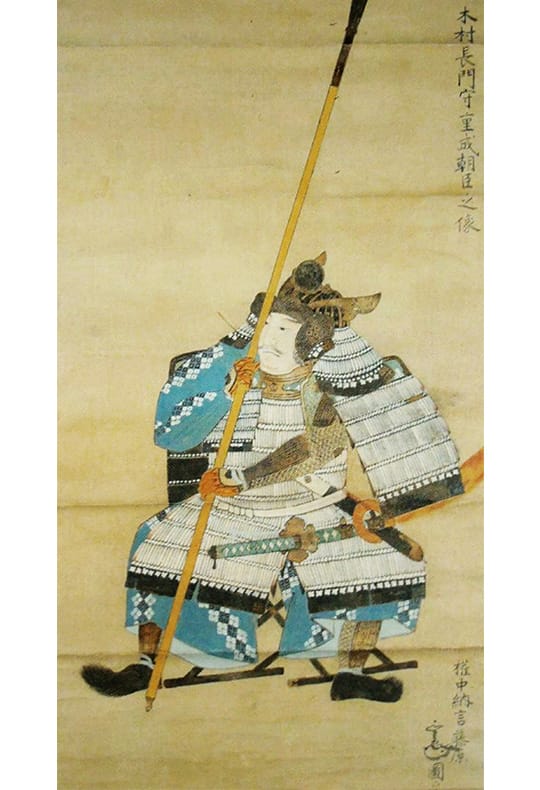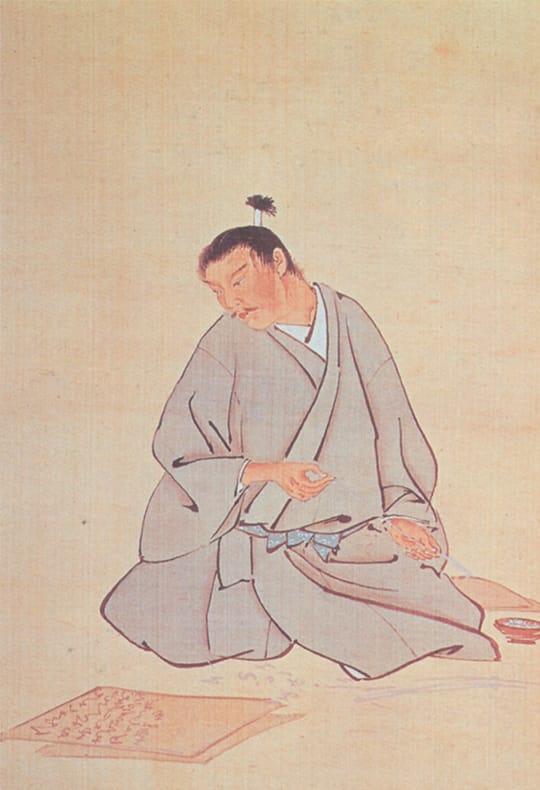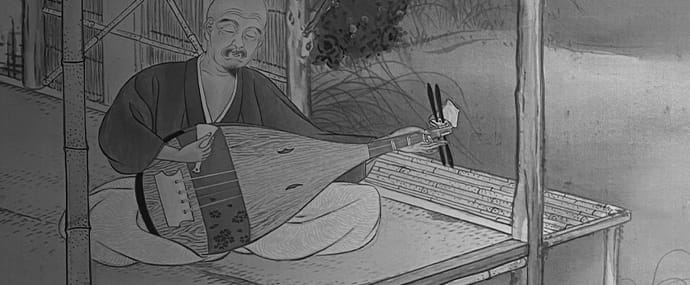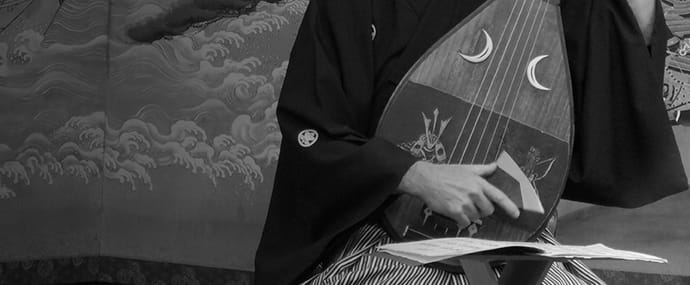Meiji Period-search

dainanko
大楠公
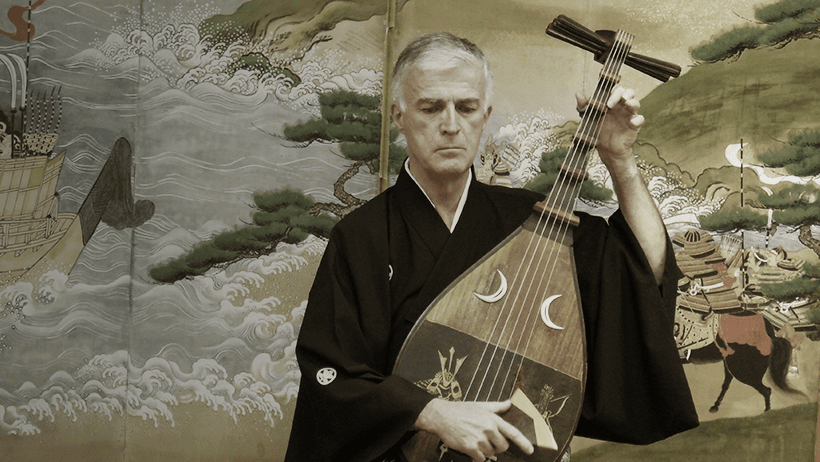
Introduction
YAMAZAKI Kyokusui, the artistic authority of the chikuzen biwa Tachibanakai-school and the first National Treasure of the biwa world, cherished this piece very much. This is understandable for a performer born in the Meiji Period (1868-1912) as the Meiji Period is characterized by the restoration of imperial power; and this ballad deals indirectly with this historical movement. In Japanese history, there in only one similar attempt to take political power away from the military leaders and return it to the emperor. This took place in the early 14th c. and KUSUNOKI Masashige, venerably referred to as Dainankō, was the symbolic center of that restoration movement. Because of the historical parallel with the Meiji Restoration, Masashige became an icon of loyalty in the early 20th c. and was naturally held in high esteem by YAMAZAKI Kyokusui.
KUSUNOKI Masashige was devoted to Emperor Godaigo (1288-1339), who had an unconventional reign. Emperors in the Middle Ages tended to be very young, and usually abdicated when they were still in their teens. Emperor Godaigo, however, reached the throne at the age of thirty, and with a strong desire to wield power, had no desire to fulfill the ritual role expected of the emperor. He belonged to one of the two lines of imperial descendants who had at that time to share mutually the succession to the throne. Godaigo opposed this rule and tried to topple the shogunate whose duty was to approve of throne successions. Godaigo got help from KUSUNOKI Masashige, a most skillful warlord from the southern part of Osaka. The name of this loyal subject, KUSUNOKI, was written with a Chinese character composed of the signs for “tree” and “south”.
Emperor Godaigo had the following dream (see Taiheiki): A child showed him a seat under a tree, which faces south, the direction the emperor traditionally faces. Godaigo valued this dream as a celestial omen and expected therefore the most unrealistic loyal deeds from his servant. When it came to the Battle at River Minatogawa, Godaigo was convinced that KUSUNOKI Masashige, despite the small number of troops at his disposal, could defeat General ASHIKAGA Takauji, who was a brilliant military strategist and leader of a huge army. Masashige knew exactly what the outcome of the war would be, but he did not dare to object to the Imperial Order and lost the final battle in the delta of the river Minatogawa.
The ballad is based on the chronicle Taiheiki (chronicle of the late 14th c.) and is a heroic rendition of the story. Noteworthy, however, is that the name of the emperor Godaigo is never once mentioned. This adds to the contemporary aura of veneration for the Chrysanthemum Throne. The text is very dense; many lines are not understandable for present-day Japanese, especially when the ballad is received only aurally without a written text for reference. This, however, meant very little as the story of Dainankō was famous, at least from the Meiji period until 1945, to the point that it was unnecessary to think about “information” when performing this ballad. The message of the piece had to be poetic, but could be veiled in order to nurture feelings of loyalty towards the emperor, the raison d’être of this ballad.
It is astonishing, that this ballad is a “piece for beginners”. The reason might be mainly technical: choice of interludes (s. Musical Notes), and choice of nagashi.
Synopsis
In the turmoil of the early 14th c. the Emperor Godaigo attempted to restore imperial power after more than a century of military rule. He opposed the regent HŌJŌ Takatoki and later the general ASHIKAGA Takauji. His most faithful subject was the warlord KUSUNOKI Masashige, later venerably called “Dainankō”. Masashige, with only some hundred men, had repulsed the HŌJŌ army at Chihaya Castle, with considerable military skill. The emperor was impressed by his strategic gifts and later ordered him to fight the general Takauji, who had put himself at the top of the warriors in Japan.
In 1336, Takauji left Kyūshū and arrived in present-day Kobe with a huge army clearly outnumbering the troops of Masashige. Masashige realized that he had no chance in winning, but his loyalty to the emperor forbid him from objecting. On his way from Kyoto to the delta of the Minatogawa river, he stopped at the village of Sakurai and summoned his eleven-year-old son Masatsura who was accompanying him. Masashige’s talk with him became one of the most famous conversations between a father and a son in Japanese history. He told his son to return to his home town and wait for his due time: after the sure death of the father in the upcoming battle, the son should continue to fight the emperor’s adversaries until their final defeat.
As Masashige had anticipated: bravery aside, the small imperial force was no match for Takauji’s huge army. When Masashige conceded defeat, he retreated with a few close warriors to a nearby farmhouse and committed suicide while reiterating his unconditional loyalty to Emperor Godaigo. His last words, actually spoken by his equally loyal brother, “I wish to be reborn seven times and continue to fight the enemies of the Throne in every life,” became a symbolic verse of veneration for the emperor in nationalistic times until 1945.

Lyrics
-
1. In the frosty snow, Trotz Frost und Schnee
Yukishimo ni 雪霜に
-
2. plum blossoms bloom and send off their fragrance verströmen Pflaumenblüten ihren Duft
baika wa sakite ka o hanachi 梅花は咲きて香を放ち
-
3. heralding the light of spring. und kündigen den Frühling an.
haru no hikari o noburu nari 春の光を宣ぶるなり
-
4. In times of turmoil when morality suffered, In kriegerischen Zeiten leidet die Moral.
taigi messuru ransei ni 大義滅する乱世に
-
5. the man who fought for the Emperor So ist denn jener Mann, der für den Kaiser kämpft,
kinnō no ikusa sossenshi 勤皇の軍率先し
-
6. and devoted his life to the Imperial Court, der für den Thron sich opfert,
chōke ni mi o ba junji taru 朝家に身をば殉じたる
-
7. showed the spirit of a hero, umso mehr ein großer Held –
chūyū giretsu no hito koso wa 忠勇義烈の人こそは
-
8. a true pillar of His Majesty’s unshaken reign. er ist im Reich des Kaisers eine wahre Stütze.
yuruganu miyo no hashira naruran 揺がぬ御代の柱なるらん
-
9. Well then, KUSUNOKI Masashige Nun denn, KUSUNOKI Masashige
satemo KUSUNOKI Hangan Masashige wa 偖も楠判官正成は
-
10. held Chihaya Castle, spare reinforcements, bot im Schlosse Chihaya
kojō Chihaya ni hyakuman no 孤城千早に百万の
-
11. against HŌJŌ’s force of one million den HŌJŌ-Kämpfern in der Übermacht
HŌJŌ zei o hikiyosete 北条勢を引寄せて
-
12. with the best of his military strategy ein halbes Jahr die Stirn – mit wenig Truppen zwar,
songo ga chibō katamuketsu 孫呉が智謀傾けつ
-
13. for over half a year. jedoch mit viel Geschick und List.
hantoshi bakari sasaeshikaba 半歳ばかり支へしかば
-
14. His defiance inspired loyalists, country-wide Dank seines Widerstandes bildete sich
chūshin yomo ni furui tachi 忠臣四方に奮ひ起ち
-
15. to rise up and topple the Shogun’s regime, eine Allianz im ganzen Land zum Sturz des Shoguns
tsuini chōteki o tōmetsushi 遂に朝敵を討滅し
-
16. thus restoring the Emperor’s Reign. und damit zur Stärkung kaiserlicher Macht.
kōten tame ni kagayakishi ga 皇天ために輝きしが
-
17. But ominous clouds furiously amassed Doch türmten sich bald wieder unheilvolle Wolken auf,
mata moya yōun muradachite 又もや妖雲叢立ちて
-
18. and the world again fell into chaos. die Welt geriet schnell aus den Fugen.
yo wa sōzen to narinikeri 世は騒然となりにけり
-
19. The first year of the Engen era, mid-fifth month, Denn im ersten Jahr der Ära Engen (1336), mitten in dem fünften Monat,
Engen gannen satsuki no nakaba 延元元年皐月の中旬
-
20. General ASHIKAGA Takauji approached from Kyūshū, führte ASHIKAGA Takauji von Kyūshū
ASHIKAGA Takauji Tsukushi yori 足利尊氏筑紫より
-
21. leading an army of five hundred thousand 500.000 Krieger an,
gojūyoman no taigun o hikii 五十余万の大軍を率い
-
22. intent on attack. um Masashige anzugreifen.
semenoboru yoshi kikoeshikaba 攻め上る由聞えしかば
-
23. Masashige received orders from the Emperor Masashige nahm vom Kaiser den Befehl entgegen,
Masashige chokujō kashikomitsu 正成勅諚かしこみつ
-
24. to strike back decisively, sich mit ganzer Kraft zu widersetzen.
kyō o saigo to kokonoe no 今日を最後と九重の
-
25. but he knew he would never return to the Capital doch er war sich klar bewusst, dass ohne die Erfüllung dieses Auftrags
miyako o ato ni azusa yumi 都を後に梓弓
-
26. without having accomplished his task. seine Rückkehr in die Hauptstadt nie mehr möglich war.
hikikaesaji to gohyaku yoki 引返さじと五百余騎
-
27. Masashige, moving 500 troops to the land of Hyōgo, Also wandte er sich – mit 500 Kriegern im Gefolge nur – in Richtung
hikiite Hyōgo ni kudari yuku Hyōgo.率いて兵庫に下り行く
-
28. made a halt at Sakurai, rich in verdant leaves. Sakurai, wo frisches Laub schon grünte,
aoba shigereru Sakurai no 青葉茂れる桜井の
-
29. Stopping his horse at a temporary shelter, wählte er für eine Ruhepause,
sato no kariya ni koma tomete 里の仮屋に駒駐めて
-
30. he asked his son Tatewaki Masatsura um mit Tatewaki Masatsura zu sprechen, seinem Sohn.
chakushi Tatewaki Masatsura o 嫡子帯刀正行を
-
31. to sit at his feet. Er rief ihn, wandte sich ihm zu und sagte:
hizamoto chikaku maneki yose 膝元近く招き寄せ
-
32. “Listen, Masatsura, „Höre, Masatsura,
ikani Masatsura kikisōrae 如何に正行聴き候へ
-
33. this time the fight bestimmt wird diese Schlacht ,
sore kono tabi no kassen wa 夫れ此度の合戦は
-
34. will be final and decisive. die letzte sein.
tenka anki no wakareme zo 天下安危の岐れ目ぞ
-
35. Your father will die in Hyōgo. Denn in Hyōgo werde ich, dein Vater, sterben.
chichi wa Hyōgo ni uchijini no 父は兵庫に討死の
-
36. I have made up my mind Darauf bin ich vorbereitet.
kakugo sadamete sōraeba 覚悟定めて候へば
-
37. and realize that today Schau ich in dein Antlitz, du mein Sohn,
nanji ga kao o min koto mo 汝が顔を見ん事も
-
38. is the last time I shall gaze upon your face. so weiß ich sicher: heute tu ich das zum letzten Mal.
kyō o kagiri to omou nari 今日を限りと思ふなり
-
39. After my death, Nach meinem Tode
ware naki nochi wa Takauji ga 我れ亡き後は尊氏が
-
40. Takauji will again do as he pleases wird Takauji sich gebärden, wie es ihm gerade passt.
hoshiimama naru furumai ni 恣まゝなる振舞に
-
41. and then the sun and the moon will shine no more; Der Mond und auch die Sonne werden nicht mehr leuchten,
jitsugetsu hikari ushinaite 日月光り失ひて
-
42. Chaos will prevail again überall wird Chaos herrschen,
mugura wa yae ni oishigeri 葎は八重に生い茂り
-
43. and the world will come to an end. denn die Welt, sie wird zu Grunde gehen.
yo wa gyōki to narinubeshi 世は澆季となりぬべし
-
44. You need to understand this well. Denk daran, vergiss es nicht.
kono kotowari o wakimaete 此の道理を弁へて
-
45. Return home now, kehre jetzt zurück
toku furusato ni kaeri yukiAlso, 疾く故郷に帰り行き
-
46. and secure the fighting power of our men. und mache unsere Truppen stark.
ichizoku rōtō fuiku shite 一族郎党扶育して
-
47. When the time comes, Sobald die Zeit gekommen ist,
toki no itaru o ukagaitsu 時機の至るを窺ひつ
-
48. entrench yourself at Mt. Kongō verschanze dich am Berge Kongō
Kongōzan ni tatekomori 金剛山に立て籠り
-
49. and swear to crush the enemies of our emperor. und zerstöre mit Gewalt die Feinde unseres Kaisers.
chikatte chōteki uchihoroboshi 誓って朝敵討ち滅ぼし
-
50. Fulfill my last intent in this way – Führe meinen Willen aus in diesem Sinne.
chichi ga shukushi o tsugeyokashi 父が宿志を継げよかし
-
51. such is loyalty towards the Emperor and your father.” Das gebietet dir die Kaisertreue und die Sohnespflicht.“
kore chūkō no michi naruzo to これ忠孝の道なるぞと
-
52. He warned him with his heart full of sorrow. So mahnte er den Sohn mit schwerem Herzen,
magokoro komete satoshitsutsu 真心こめて諭しつゝ
-
53. Being aware that this was his farewell to his son, wissend, dass er damit Abschied nahm für immer.
kore ga isse no wakare ka to 之が一世の別れかと
-
54. he spilled, even as a fierce warrior, Er vergoss trotz aller Tapferkeit
omoeba takeki mononofu mo 思へば猛き武夫も
-
55. tears, and continued, viel Tränen, als er sprach:
kobosu ya tsuyu no hito shizuku こぼすや露の一と雫
-
56. “For the Emperor’s sake you shall be sacrificed, „Du wirst dein Leben für den Kaiser opfern,
kimi ga tame chire to oshiete onore mazu 君がため散れと訓えて己まづ
-
57. but for me the storm is already blowing here in Sakurai. hier in Sakurai weht bereits der Sturm für mich.“
arashi ni mukau Sakurai no eki 嵐に向ふ桜井の駅
-
58. Arriving at the delta-fields of the river Minatogawa, Im Delta des Minato-Flusses, wo er später eintraf,
Minatogawara ni tsukikereba 湊川原に着きければ
-
59. the morning wind rushed down from Mt. Maya blies vom Maya-Berg herunter heftig stark ein Morgenwind,
Maya fuki orosu asakaze ni 摩耶吹き颪す朝風に
-
60. fluttering the flags with the kikusui crest, der all die Flaggen mit dem kikusui-Wappen flattern ließ,
kikusui no hata hirugaeshi 菊水の旗翻がへし
-
61. as they waited for the approaching enemy. als man den Feind erwartete.
teki ya kitare to matsu hodo ni 敵や来れと待つ程に
-
62. On the seaside as well as on the mountainside Vom Meer her und vom Land sich nähernd
namiji kugaji o uchiutsurane 浪路陸路を打ち連ね
-
63. they met with over 500,000 of Takauji’s warriors. traf bald Takauji ein mit einer halben Million von Kriegern.
gojūyoman no Ashikagazei 五十余万の足利勢
-
64. The crests of futatsubiki, yotsume Seine Flaggen mit den Wappen futatsubiki, yotsume
futatsubikiryō yotsumeyui 二つ引両四つ目結ひ
-
65. and wachigai unfurled on their flags. und wachigai, sie wirbelten im Sturm.
wachigai no hata henpon to 輪違の旗へんぽんと
-
66. The warriors ran like stormy clouds Bald war’s ein wildes Rennen, hin und her
unka no gotoku oshitatete 雲霞の如く押し立てゝ
-
67. to the intense beats of the gongs and drums. zu Trommelwirbeln und zu Schlägen auf dem Riesen-Gong.
kinko tōtō semeyosuru 金鼓とうとう攻め寄する
-
68. When Masashige observed this, he said Masashige schaute hin und sagte sich:
Masashige kitto uchinagame 正成きっと打眺め
-
69. “This is the glorious deadly battle, “Dies ist die letzte Schlacht,
ideya kesshi no hareikusa いでや決死の晴軍
-
70. I will solely fix Takauji and Tadayoshi in my sights.” ich will als Gegner mir Takauji und Tadayoshi wählen“,
mezasu wa Takauji Tadayoshi to 目指すは尊氏直義と
-
71. And he rushed into the heart of enemy’s fray und so stürmte er ins Schlachtgetümmel,
muragaru teki no mattadanaka ni 群る敵の真只中に
-
72. slashing all quarters with reckless abandon, kämpfend ohne Rück- und Vorsicht wie ein wild Gewordner.
omote mo furazu kitte iru 面もふらず斬って入る
-
73. blade shimmering, battle cries thundering, Seine Waffe blitzte, seine Schreie donnerten.
kenkō kirameki toki no koe 剣光きらめき鬨の声
-
74. and faithful long sword sweeping – Er schlug mit seinem großen Schwert drauflos –
chūkon giki no tachikaze ni 忠魂義気の太刀風に
-
75. this was indeed the final fight. dies war sein wahrlich letzter Kampf.
koko o sendo to tatakaishi ga こゝを先途と戦ひしが
-
76. With enemy numbers that remained overwhelming, Die Zahl der Feinde aber blieb erdrückend groß,
shūka tsui ni tekishikane 衆寡遂に敵し兼ね
-
77. blood flowed like water currents, und Blut floss überall in Strömen,
nagaruru chishio wa takitsuse ka 流るゝ血汐は滝津瀬か
-
78. helmets flew away and armor was crushed. Helme flogen auf und Harnische zerbarsten.
kabuto tobisari yoroi wa chigire 兜飛び去り鎧は千截れ
-
79. More and more warriors died – Krieger fielen einer nach dem andern,
gunpyō shidai ni uchijini shi 軍兵次第に討死し
-
80. only seventy-three remained nur noch ganze 73 blieben übrig –
nokoru shichijūsanki sae 残る七十三騎さへ
-
81. of whom none were without wounds. keiner ohne Wunden.
fukade o owanu mono mo nashi 深傷を負はぬ者もなし
-
82. This was the final struggle Das war nun das Ende!
mohaya ikusa mo koremade nari to 最早戦も之迄なりと
-
83. and they ran to nearby houses. Und so suchten sie in einem nahen Hause Schutz.
to aru minka ni hashiri iri と在る民家に走り入り
-
84. WADA, HASHIMOTO, SHINGŪJI, WADA, HASHIMOTO, SHINGŪJI,
WADA HASHIMOTO SHINGŪJI 和田橋本神宮寺
-
85. USAMI and other important warriors USAMI und andere Getreue
USAMI nando no muneto no bushi to 宇佐美なんどの宗徒の武士と
-
86. took off their helmets and sat down with composure. zogen sich den Helm vom Kopf und nahmen Haltung an.
yoroi o nugite tanza nashi 鎧を脱ぎて端坐なし
-
87. “Our swords are broken, our quivers empty. „Unsre Schwerter sind gebrochen, alle Pfeile weggeschossen.
katana wa ore ya wa tsukihatete 刀は折れ矢はつきはてゝ
-
88. There is nothing left I can do. Nichts mehr können wir hier richten.
shin ga koto sudeni owannu 臣が事既に畢んぬ
-
89. However, I wish to be reborn seven times Dennoch möchte ich noch sieben Mal geboren werden
nanatabi kono yo ni umarekite 七度この世に生れ来て
-
90. and continue to fight for the Throne in every life. und in jedem Leben für den Thron und für denKaiser kämpfen.
tada chōteki o horobosan 唯朝敵を滅ぼさん
-
91. Such is my deepest longing.” Das ist alles, was mein Herz begehrt.“
kore zo saigo no ichinen to 是ぞ最後の一念と
-
92. And he faced towards the north and prayed, Sich nach Norden wendend betete er voller Inbrunst,
kita ni mukatte saihaishi 北に向って再拝し
-
93. and then, exchanged deadly strokes with brother Masasue, stürzte sich kreuzweise mit dem Bruder Masasue in das Schwert.
otooto Masasue to sashichigai 弟正季と剌し違ひ
-
94. and so the brave souls departed. Die beiden tapfren Brüder nahmen gegenseitig sich das Leben.
yūkon munashiku narinikeri 雄魂空しくなりにけり
-
95. Aah, loyal Lord KUSUNOKI! Ah, ergebener Fürst KUSUNOKI!
aa chūshin Nankō no 嗚呼忠臣楠公の
-
96. A visit to the place of His honorable death, Dein Ehren-Grabmal wollen wir besuchen,
tama to kudakeshi ato toeba 玉と砕けし跡訪へば
-
97. the kikusui-chrysanthemum floating in the pure waters denn die kikusui-Chrysanthemen werden in dem reinen Wasser schwimmen,
Chinu no urawa ni kikusui no ちぬの浦曲に菊水の
-
98. of the river Minatogawa on its way into the Bay of Chinu. das der Fluss Minatogawa in die Bucht von Chinu fließen lässt.
nagare mo kiyoki Minatogawa 流れも清き湊川
-
99. The glory of his merits will always Für immer wird der Ruhm von deinen Taten währen.
tateshi isao wa chiyo kakete たてし勲は千代かけて
-
100. be fragrant – for eternities to come, Welch ein Duft, der nie entschwindet.
yorozuyo made mo kaoruran 万代までも香るらん
-
101. be fragrant – for eternities to come, Welch ein Duft, der nie vergeht.
yorozuyo made mo kaoruran 万代までも香るらん
Notes
1.-8. …The makura (prologue) starts with the image of plum blossoms, an ancient symbol of endurance or heroism, under a cover of snow.Masashige is the embodiment of these qualities. The frosty snow may be a symbol for his moving against the current of the time and in general for the adversities he faced in his loyal activities. 10. Chihaya Castle…The term “castle” here may be misleading. Such fortresses were more like makeshift military camps surrounded by walls to fend off attacking enemies. There was no palatial luxury at all in such locations. Chihaya is nowadays called by its its full name of Chihaya Akasaka Mura, and located in Minami Kawachi, south of Osaka. 11. HŌJŌ… The HŌJŌ clan ursurped the actual power of the shogunate after the first Shogun, MINAMOTO no Yoritomo, had died after ruling for 35 years. Their end was brought indirectly by the Mongolian invasions of 1274 and 1281, which were financially a disaster for the shogunate – the leaders could not pay their warriors because there were no spoils of war in these military actions against an external attacker. With economic problems rising, loyalty started to fade and the HŌJŌ clan lost more and more influence and authority. The number of HŌJŌ soldiers given here is for sure exaggerated, the figures only used to make Masashige’s merit of defying the enemy troops more impressive. 19. The exact date is the 4th of July 1336. 20. General ASHIKAGA Takauji… ASHIKAGA Takauji is one of the great personalities and talented men in Japanese history who were not popular. His deeds – although deeply tainted by personal ambition– are much more brilliant than the deeds of the loyal warlord Masashige who captures the feelings of ordinary people with his tragic career. At first, Takauji got along well with Emperor Godaigo, but refused the Imperial Order to return to Kyoto after having assembled many powerful warriors of Japan behind him in Kamakura. For his disobedience, he was attacked by imperial troops and had to flee to Kyūshū. Takauji was convinced that he should again secure the samurai rule, which had been questioned by Emperor Godaigo. His concept proved to be right: the system of military rule in Japan with the emperor in symbolic functions (which had started in the 13th c.) lasted after him until the late 19th c. 27. five hundred thousand troops … These figures of warriors in the army of ASHIKAGA Takauji are also far too large, although it is correct that they were several times bigger than the figures of Masashige’s troops. 28. at Sakurai green foliage is abundant… Sakurai is located in the village of Shimamoto in the county of Mishima (Osaka prefecture). It is unclear why the green leaves in Sakurai are mentioned. There may be a link to a song which was popular in the Meiji Period (a so called shōka: Aoba shigereru sakurai no sato no watari no yūmagure ki no shita kage… “In the village of Sakurai, where fresh green leaves provide shade in the evening…”) 30. Tatewaki Masatsura …he was the 11 year old son of Masashige. The term Tatewaki refers to a military position, 48. Mt Kongō… “Chihaya Castle” (see note for line 10.) was located at the foot of this mountain. 58. delta-fields of the river Minatogawa… The location is in present-day Kobe-city, Chūō-ward. 59. Mt. Maya… is in the back of present-day Kobe-city, Nada-ward. 60. kikusui… means “Chrysanthemum in the water” (chrysanthemum = kiku and water = sui). The flag shows a half sunken chrysanthemum floating on a river in the form of the letter S. Because the chrysanthemum is also the imperial flower, Masashige’s flag was cherished in the nationalistic period of Japan. The final battles of Okinawa between April 6th and June 22nd 1945 where the notorious kamikaze attacks took place, were called “Operation Kikusui”. 64. Futatsubiki yotsumeyui wachigai… These expressions refer to the graphic design of the crests on the flags. (see below supplementary) 70. Takauji and Tadayoshi… Tadayoshi was the younger brother of Takauji. 80. only seventy-three warriors …The source of these numbers is the Taiheiki (14th c.) 84/85. WADA, HASHIMOTO, SHINGŪJI. USAMI…WADA Gorō Masataka, HASHIMOTO Hachirō Masakazu, SHINGŪJI Tarōbyōe Masamoro, USAMI Kawachino kami Masayasu were kin or closest retainers of Masashige. 89/90 reborn seven times…these famous last words were actually uttered by Masashige’s brother Masasue. Only later, in the Meiji period (1868-1912), they were put into Masashige’s mouth, in order to complement the legend. 95. “Aah, loyal Lord KUSUNOKI”… in 1692 a monument for Masashige was erected by Mito Mitsukuni at the present burial site of Minatogawa Shrine (in Kobe) with these words carved in stone. 97. Chinu no urawa…equals Osaka Bay.
Supplementary to the note of lines 60. and 64./65
-
kikusui

-
futatsubiki

-
yotsumeyui

-
wachigai


Music Notes
This piece is compact with only hundred lines. Because KUSUNOKI Masashige (Dainankō) has been held in highest esteem since the restoration of imperial rule in the Meiji-Period (1868-1912) all vocal parts connected with heroism or a sacrifice for the emperor’s case are treated specially. It starts with line 7 when the word giretsu (the righteous case) has to be sung with a powerful accent which, almost leaves the tone system during the three syllables of this word. In the next line, when Masashige is called “a true pillar of His Majesty’s unshaken reign” an elaborate melisma is required which is usually absent at this stage of the introduction part of a ballad, before the name of the main “actor” (here in line 9) has been mentioned.
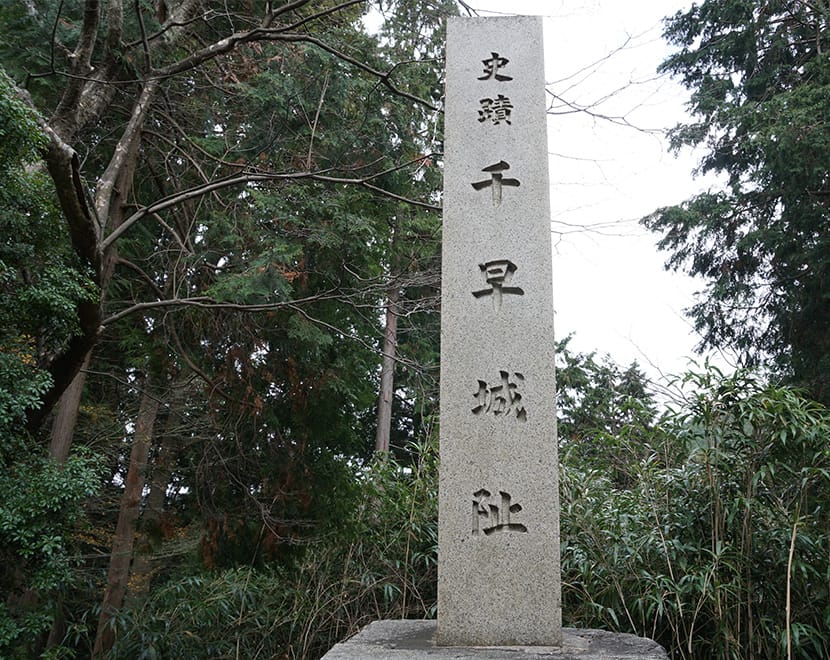
Two arioso passages (lines 25-29), so-called nagashi, are sung (quite rarely in direct succession) in the famous scene of Masashige’s meeting his son in Sakurai village, where he lectures him on loyalty and the obligation of sacrifice for the emperor.
After this calmly structured father-son talk the ballad moves from line 58 on into battle-field scenery. It is here, for the first time, (except little high-range flashes in the two nagashi of lines 25-29) that a whole line is required to be sung at the highest pitch of declamation (number “7”). With such a compositional decision, the change within the narrative plot is clearly structured.
It is also obvious that the display and choice of interludes is carefully conceived. The most appropriate interludes for musical battle-depiction are the group of interludes with the term Chō (丁). Only rarely do we get a build-up as seen in this ballad, when Chō two (after line 67) is followed by Chō three (after line 72) and again some lines later by Chō four (after line 75).
The emotional climax, however, is reached at the beginning of line 95. This line starts with the exclamation “aa” followed by “loyal Lord KUSUNOKI!” This line is actually a citation of a text-line in a carved monument, which was erected in 1692 for the veneration of KUSUNOKI Masashige. It bears the essence of what this hero meant and still means to all Japanese deeply loyal to the throne. YAMAZAKI Kyokusui could not be easily pleased by its vocal rendition. She wanted to have the singer starting the “aah” with letting his voice coming from the deepest place in the body aiming at an almost supra-musical invocation. Having the melisma on “aah” performed just as a “sung melody” would be insufficient for expressing deep devotion towards Dainankō.
